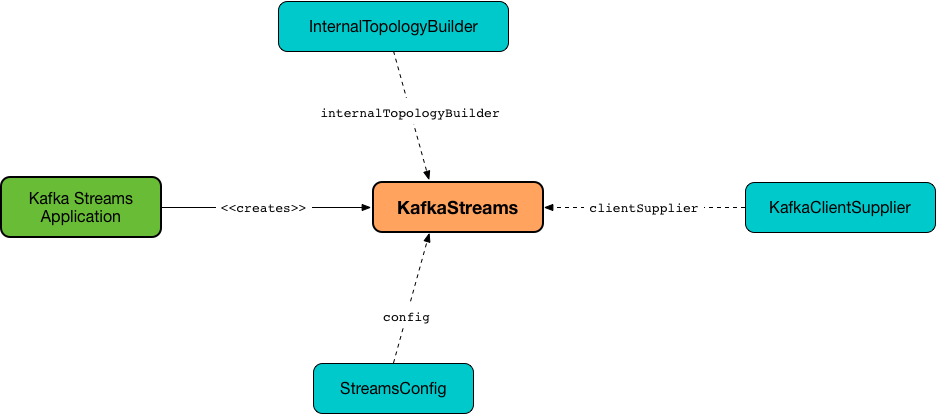Collection<StreamsMetadata> allMetadata()KafkaStreams — Streams Client
KafkaStreams is the interface for managing and inspecting the execution environment of the processing topology of a Kafka Streams application.
|
Note
|
A KafkaStreams instance is also referred by the name streams client (esp. in logs).
|
A KafkaStreams instance (process) can be started or closed (shut down). The current state is available using state.
KafkaStreams is running when the state is either RUNNING or REBALANCING.
There could be many KafkaStreams instances running simultaneously (e.g. as separate JVM processes each with its own StreamThreads). While a KafkaStreams instance is running, it allows for inspecting streams metadata using allMetadata, allMetadataForStore, and metadataForKey methods.
A KafkaStreams instance exposes monitoring metrics (incl. the Kafka Producer, Consumers, and AdminClient).
Only when in CREATED state, a KafkaStreams instance can be registered with StateRestoreListeners, StateListeners, and UncaughtExceptionHandlers.
| Method | Description |
|---|---|
|
StreamsMetadatas for all instances in a multi-instance Kafka Streams application |
|
|
|
Cleans up the local directory with state stores |
|
Closes the |
|
|
|
|
|
Kafka monitoring metrics of the |
|
Registers a global StateRestoreListener |
|
Registers a KafkaStreams.StateListener |
|
Registers a java.lang.UncaughtExceptionHandler |
|
Starts the |
|
The current state of the |
|
|
KafkaStreams is simply a Kafka client that consumes messages from and produces the processing results to Kafka topics (abstracted as SourceNodes and SinkNodes, respectively).

|
Note
|
A Kafka Streams developer describes the processing logic using a Topology directly (that is a graph of processors) or indirectly through a StreamsBuilder that provides the high-level DSL to define transformations and build a stream processing topology. |
val topology: Topology = ...
val config: StreamsConfig = ...
import org.apache.kafka.streams.KafkaStreams
val ks = new KafkaStreams(topology, config)Once created, KafkaStreams is started up to start consuming, processing, and producing records (as described by a Topology).
ks.start(only when in CREATED state) KafkaStreams can be given a StateRestoreListener to be informed about the state-related events: onRestoreStart, onBatchRestored and onRestoreEnd (through DelegatingStateRestoreListener).
import org.apache.kafka.streams.processor.StateRestoreListener
val userRestoreListener: StateRestoreListener = ???
ks.setGlobalStateRestoreListener(userRestoreListener)KafkaStreams uses a InternalTopologyBuilder for the following:
-
Creating a StreamsMetadataState, StreamThreads and QueryableStoreProvider
-
Requesting a global processor topology (for a GlobalStreamThread)
KafkaStreams uses stream-client [client.id] for the log prefix (with the clientId).
|
Tip
|
Enable Add the following line to Refer to Application Logging Using log4j. |
Cleaning Up Local Directory for State Stores — cleanUp Method
void cleanUp()cleanUp simply requests StateDirectory to clean when KafkaStreams is not running.
cleanUp reports a IllegalStateException when KafkaStreams is running.
Cannot clean up while running. Closing KafkaStreams — close Method
void close() (1)
synchronized boolean close(final long timeout, final TimeUnit timeUnit)-
Calls
close(final long timeout, final TimeUnit timeUnit)with 0 timeout
close…FIXME
|
Important
|
Always execute close on a KafkaStreams instance even if you never call start to avoid resource leaks.
|
Creating KafkaStreams Instance
// public API
KafkaStreams(
final Topology topology,
final Properties props) (1)
// public API (mostly for testing)
KafkaStreams(
final Topology topology,
final Properties props,
final KafkaClientSupplier clientSupplier) (3)
KafkaStreams(
final Topology topology,
final Properties props,
final Time time) (4)
// private/internal API
KafkaStreams(
final InternalTopologyBuilder internalTopologyBuilder,
final StreamsConfig config,
final KafkaClientSupplier clientSupplier) (5)
KafkaStreams(
final InternalTopologyBuilder internalTopologyBuilder,
final StreamsConfig config,
final KafkaClientSupplier clientSupplier,
final Time time) (6)-
Calls the internal
KafkaStreams(5) with a new DefaultKafkaClientSupplier -
Calls the internal
KafkaStreams(6) withSystemTime
KafkaStreams takes the following to be created:
KafkaStreams initializes the internal properties.
While being created, KafkaStreams…FIXME
KafkaStreams requests the input KafkaClientSupplier for a Kafka AdminClient (for the AdminClient configuration for the clientId).
setRunningFromCreated Internal Method
boolean setRunningFromCreated()setRunningFromCreated…FIXME
|
Note
|
setRunningFromCreated is used exclusively when KafkaStreams is started.
|
Starting KafkaStreams — start Method
synchronized void start()
throws IllegalStateException, StreamsExceptionstart starts the Topology (that in turn starts consuming, processing, and producing records).
Internally, start prints out the following DEBUG message to the logs:
Starting Streams clientstart marks KafkaStreams as running (i.e. transitions from CREATED to RUNNING state and notifies StateListeners).
start starts global stream thread if defined (which is when…FIXME)
start starts stream threads.
start schedules a thread that requests StateDirectory to cleanRemovedTasks every state.cleanup.delay.ms milliseconds.
You should see the following DEBUG message in the logs:
Started Streams clientIn case the changing state to running fails, start merely prints out the following ERROR message to the logs:
Already stopped, cannot re-start Registering Global StateRestoreListener — setGlobalStateRestoreListener Method
void setGlobalStateRestoreListener(final StateRestoreListener globalStateRestoreListener)setGlobalStateRestoreListener registers a StateRestoreListener (in a Kafka Streams application).
Internally, setGlobalStateRestoreListener simply sets the globalStateRestoreListener internal property to be the input StateRestoreListener (only when in CREATED state).
setGlobalStateRestoreListener throws a IllegalStateException when not in CREATED state:
Can only set GlobalStateRestoreListener in CREATED state. Current state is: [state] allMetadata Method
Collection<StreamsMetadata> allMetadata()allMetadata makes sure that KafkaStreams is running and requests the StreamsMetadataState for metadata.
Making Sure That KafkaStreams Is Running — validateIsRunning Internal Method
void validateIsRunning()validateIsRunning throws a IllegalStateException when KafkaStreams is not running. Otherwise, validateIsRunning does nothing.
KafkaStreams is not running. State is [state].|
Note
|
validateIsRunning is used when KafkaStreams is requested to allMetadata, allMetadataForStore, metadataForKey, metadataForKey, store, and localThreadsMetadata.
|
Internal Properties
| Name | Description | ||
|---|---|---|---|
|
Used for the following:
|
||
|
A user-defined global StateRestoreListener to be notified about the state-related events: onRestoreStart, onBatchRestored and onRestoreEnd (through DelegatingStateRestoreListener) Set using setGlobalStateRestoreListener method |
||
|
|
||
|
A single-threaded executor ( Used to schedule a periodic action that requests the StateDirectory to cleanRemovedTasks after and every state.cleanup.delay.ms milliseconds (and only when the state is Initialized when |
||
|
Kafka AdminClient (that allows for managing and inspecting topics, brokers, configurations and ACLs)
|
||
|
Client ID that is initialized when
|
||
|
|||
|
|||
|
|||
|
StreamsMetadataState (with the InternalTopologyBuilder and application.server configuration property)
Initialized when |
||
|
|